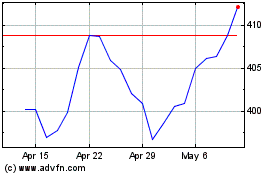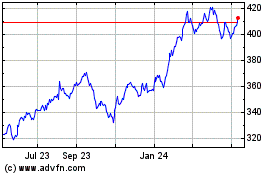Buffett Loads Up On Treasury Bills -- WSJ
February 24 2018 - 2:02AM
Dow Jones News
By Nicole Friedman and Daniel Kruger
This article is being republished as part of our daily
reproduction of WSJ.com articles that also appeared in the U.S.
print edition of The Wall Street Journal (February 24, 2018).
Berkshire Hathaway Inc. shareholders will look to Warren
Buffett's annual letter on Saturday for new clues of what the
conglomerate plans to do with more than $100 billion in cash.
There is little mystery about who is getting that money
meanwhile: Uncle Sam.
Berkshire has used its mounting cash pile to become one of the
world's largest owners of U.S. Treasury bills after struggling to
find big companies to buy in recent years.
It held $109 billion in cash as of Sept. 30, up from $86 billion
at the end of 2016 and more than double what it had at the end of
2006. Nearly all of that was invested in short-term bills,
according to Mr. Buffett.
Berkshire has an outsize presence in the $2 trillion market for
Treasury bills, a type of government debt that matures in a year or
less. It held more bills around the end of the third quarter than
large countries such as China and the U.K. It also had more at that
time than the $13.5 billion held collectively by a group of 23
primary bond dealers that are obligated to underwrite U.S.
government debt sales.
Berkshire's holdings are big enough that when bond dealers need
bills for a specific date, they will come to Berkshire and arrange
a trade, Mr. Buffett said.
"We're the ones they call. We've got the best inventory," Mr.
Buffett said in a 2017 interview with The Wall Street Journal.
"That's a new sideline for us here."
Shortages of Treasury bills have been a particular problem for
bond dealers and investors at recent points. When the U.S.
government approached its debt ceiling in recent years, the
government was sometimes forced to sell fewer bills, making them
scarce in the market. A recent budget deal pushed back the next
debt-ceiling showdown until March 2019.
The Omaha, Neb., billionaire uses his widely read annual
shareholder letter to recap Berkshire's results and discuss broader
financial themes. He typically says little about where he could
turn next for an acquisition, although he has acknowledged in other
settings that pressure is mounting for Berkshire to find better
uses for its massive cash holdings.
Those holdings grew by an additional $3.3 billion last week when
Phillips 66 repurchased 35 million of its shares from
Berkshire.
"There's no way I can come back here three years from now and
tell you that we hold $150 billion or so in cash or more, and we
think we're doing something brilliant by doing it," he said at
Berkshire's annual meeting last May. "I would say that history is
on our side, but it would be more fun if the phone would ring."
Berkshire hasn't made a major buy since it agreed to acquire
aerospace manufacturer Precision Castparts Corp. in 2015 for more
than $32 billion, its biggest deal ever. A deal last year to buy
Texas power-transmission company Oncor for $9 billion in cash was
terminated after Oncor's parent company got a higher offer.
Mr. Buffett has long resisted using cash to pay a dividend,
partly because of the tax consequences for shareholders. He has
said the company would buy back stock if its price falls below 120%
of book value. Both classes of Berkshire stock traded Thursday at
165% of book value.
"He's aware that [Berkshire's cash] is not earning a high rate
of return for shareholders," said David Kass, a professor at the
University of Maryland's Robert H. Smith School of Business and a
Berkshire shareholder. "Paying out a special cash dividend, a
one-time dividend at the discretion of management, makes some
sense."
Berkshire earns revenue from holding and trading its Treasury
bills, but the profit is minimal relative to its overall business
operations. Berkshire's head trader, Mark Millard, declined to
comment.
Other corporations with large cash holdings tend to invest in
higher-yielding assets such as corporate bonds. But Berkshire
prefers to hold Treasury bills because they would provide more
liquidity during a market downturn, Mr. Buffett said on CNBC last
month. Mr. Buffett used Berkshire's financial strength during the
financial crisis to throw lifelines to companies including Goldman
Sachs Group Inc. and General Electric Co. in 2008.
"I believe at some point in the future, they'll be rewarded,
[and] we'll be rewarded as shareholders, for having all that cash,"
said Trip Miller, managing partner of Gullane Capital Partners LLC
in Memphis, Tenn. "They'll be sitting there ready to pounce."
Mr. Buffett's current involvement in the Treasury market is less
stressful than one in the early 1990s. Mr. Buffett stepped in as
chairman of Salomon Inc. in 1991 after a rogue trader was caught
trying to corner the market in two-year government debt by
manipulating the auction process to buy more bonds than
allowed.
Berkshire typically buys about $4 billion in Treasury bills
every Monday at government auctions, or less than 4% of what the
Treasury is selling, Mr. Buffett said on CNBC in January. He joked:
"We're very careful about how many we bid for."
Write to Nicole Friedman at nicole.friedman@wsj.com and Daniel
Kruger at Daniel.Kruger@wsj.com
(END) Dow Jones Newswires
February 24, 2018 02:47 ET (07:47 GMT)
Copyright (c) 2018 Dow Jones & Company, Inc.
Berkshire Hathaway (NYSE:BRK.B)
Historical Stock Chart
From Mar 2024 to Apr 2024

Berkshire Hathaway (NYSE:BRK.B)
Historical Stock Chart
From Apr 2023 to Apr 2024
